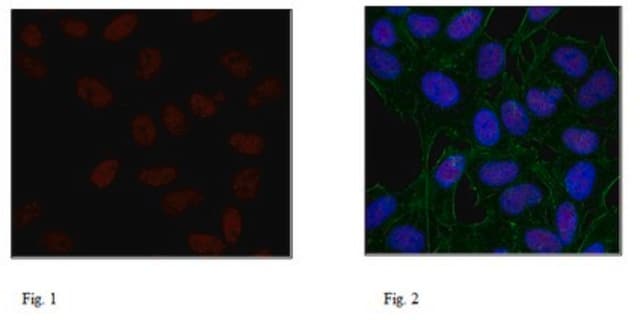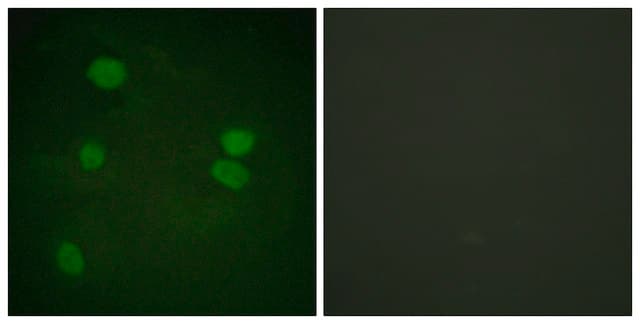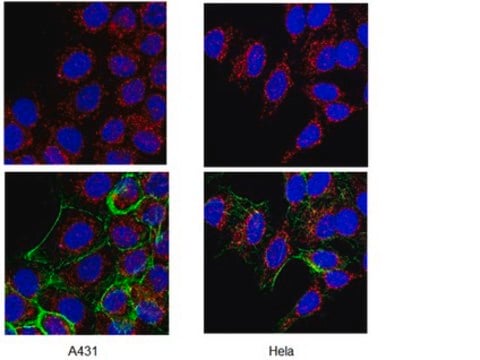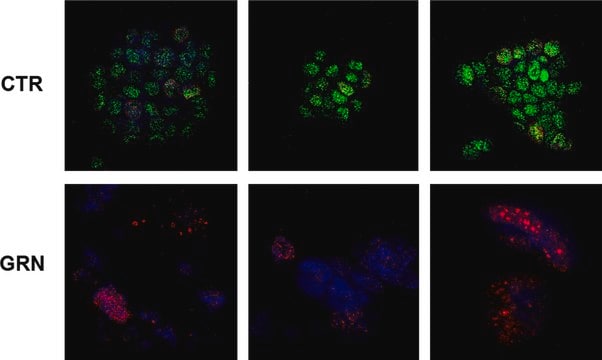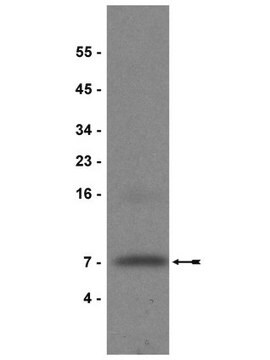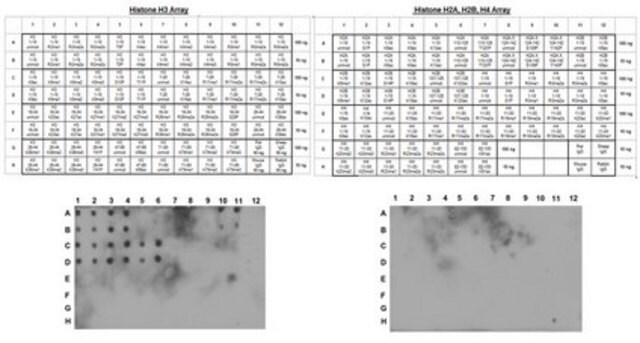05-499
Anti-Histone H3 Antibody, clone 6.6.2
clone 6.6.2, Upstate®, from mouse
Synonym(s):
H3 histone, family 3A
Sign Into View Organizational & Contract Pricing
All Photos(4)
About This Item
UNSPSC Code:
12352203
eCl@ss:
32160702
NACRES:
NA.41
Recommended Products
biological source
mouse
Quality Level
antibody form
purified immunoglobulin
antibody product type
primary antibodies
clone
6.6.2, monoclonal
species reactivity
vertebrates, human, plant
manufacturer/tradename
Upstate®
technique(s)
western blot: suitable
isotype
IgG1κ
NCBI accession no.
UniProt accession no.
shipped in
dry ice
target post-translational modification
unmodified
Gene Information
human ... H3F3B(3021)
General description
This monoclonal antibody was generated using an unmodified peptide corresponding to the first 20 amino acids of histone H3 and is specific for an unmodified epitope in that region.
Specificity
This antibody recognizes and is specific for histone H3, Mr 17kDa.
This peptide sequence is identical in a wide range of animal and plant species.
Immunogen
Epitope: a.a. 1-20
KLH conjugated peptide corresponding to amino acids 1-20 [ARTKQTARKSTGGKAPRKQLC] of human histone H3. Clone 6.6.2.
Application
Anti-Histone H3 Antibody, clone 6.6.2 is a Mouse Monoclonal Antibody for detection of Histone H3 also known as H3 histone family 3A & has been validated in WB.
Research Category
Epigenetics & Nuclear Function
Epigenetics & Nuclear Function
Research Sub Category
Transcription Factors
Transcription Factors
Quality
Routinely evaluated by western blot on acid extracted lysates from HeLa cells.
Western Blot Analysis:
0.5-2 µg/mL of this lot detected Histone H3 in acid extracted lysates from HeLa cells.
Western Blot Analysis:
0.5-2 µg/mL of this lot detected Histone H3 in acid extracted lysates from HeLa cells.
Target description
17 kDa
Physical form
Format: Purified
Protein G Chromatography
Purified mouse monoclonal IgG1κ in buffer containing 70% storage buffer 0.1 M Tris-glycine, pH 7.4, 0.15 M NaCl, with 0.05% sodium azide and 30% glycerol.
Storage and Stability
Stable for 1 year at -20°C from date of receipt.
Handling Recommendations:
Upon receipt, and prior to removing the cap, centrifuge the vial and gently mix the solution. Aliquot into microcentrifuge tubes and store at -20ºC. Avoid repeated freeze/thaw cycles, which may damage IgG and affect product performance. Note: Variability in freezer temperatures below -20ºC may cause glycerol-containing solutions to become frozen during storage.
Handling Recommendations:
Upon receipt, and prior to removing the cap, centrifuge the vial and gently mix the solution. Aliquot into microcentrifuge tubes and store at -20ºC. Avoid repeated freeze/thaw cycles, which may damage IgG and affect product performance. Note: Variability in freezer temperatures below -20ºC may cause glycerol-containing solutions to become frozen during storage.
Analysis Note
Control
HeLa cell extract
HeLa cell extract
Other Notes
Concentration: Please refer to the Certificate of Analysis for the lot-specific concentration.
Legal Information
UPSTATE is a registered trademark of Merck KGaA, Darmstadt, Germany
Disclaimer
Unless otherwise stated in our catalog or other company documentation accompanying the product(s), our products are intended for research use only and are not to be used for any other purpose, which includes but is not limited to, unauthorized commercial uses, in vitro diagnostic uses, ex vivo or in vivo therapeutic uses or any type of consumption or application to humans or animals.
Not finding the right product?
Try our Product Selector Tool.
Storage Class Code
10 - Combustible liquids
WGK
WGK 1
Certificates of Analysis (COA)
Search for Certificates of Analysis (COA) by entering the products Lot/Batch Number. Lot and Batch Numbers can be found on a product’s label following the words ‘Lot’ or ‘Batch’.
Already Own This Product?
Find documentation for the products that you have recently purchased in the Document Library.
A HIGHLY SELECTIVE OLIGOPEPTIDE BINDING PROTEIN FROM THE ARCHAEON SULFOLOBUS SOLFATARICUS.
Gogliettino M, Balestrieri M, Pocsfalvi G, Fiume I, Natale L, Rossi M, Palmieri G
Journal of Bacteriology null
Induction of human fetal hemoglobin via the NRF2 antioxidant response signaling pathway.
Macari, ER; Lowrey, CH
Blood null
Phase I pharmacokinetic and pharmacodynamic evaluation of combined valproic acid/doxorubicin treatment in dogs with spontaneous cancer.
Wittenburg LA, Gustafson DL, Thamm DH
Clinical cancer research : an official journal of the American Association for Cancer Research null
Glycosylation and sialylation of macrophage-derived human apolipoprotein E analyzed by SDS-PAGE and mass spectrometry: evidence for a novel site of glycosylation on Ser290.
Lee Y, Kockx M, Raftery MJ, Jessup W, Griffith R, Kritharides L
Molecular and Cellular Proteomics null
Brian D Cherrington et al.
PloS one, 5(7), e11768-e11768 (2010-07-30)
Peptidylarginine Deiminases (PADs) convert arginine residues on substrate proteins to citrulline. Previous reports have documented that PAD2 expression and activity varies across the estrous cycle in the rodent uterus and pituitary gland, however, the expression and function of PAD2 in
Our team of scientists has experience in all areas of research including Life Science, Material Science, Chemical Synthesis, Chromatography, Analytical and many others.
Contact Technical Service